Text


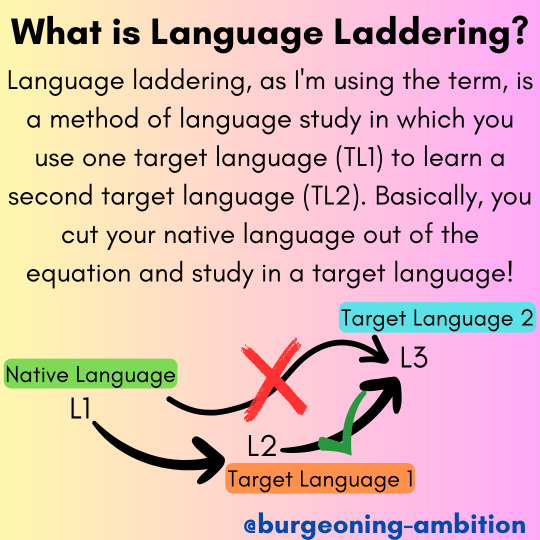

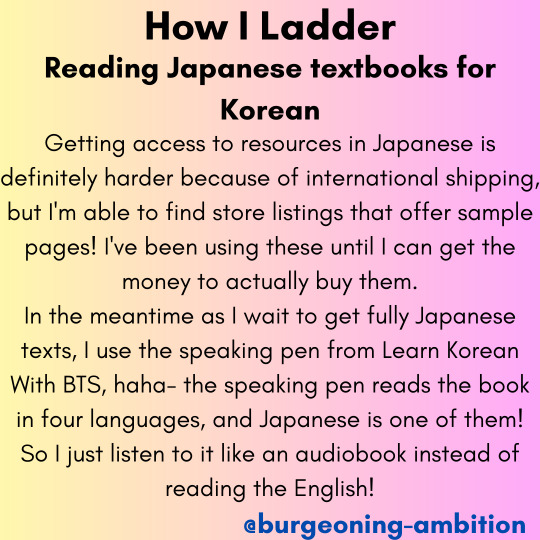
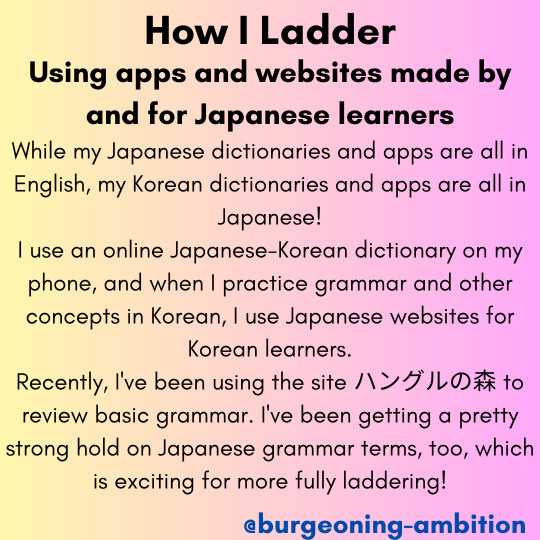

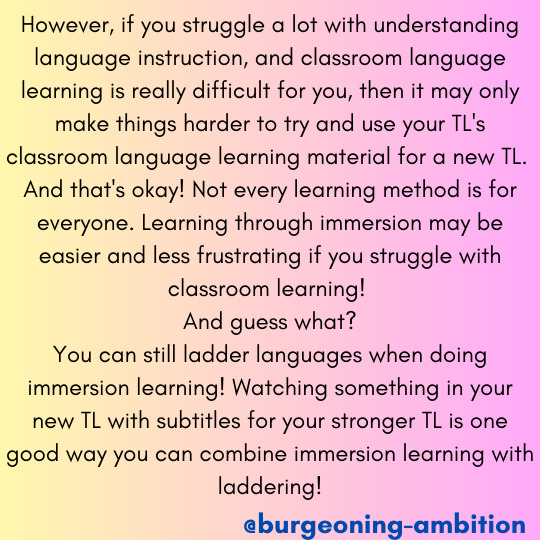

Finally a first language laddering post! In the near future I hope to start posting updates to my personal studying, maybe accompanied by study materials for others to use if I have the time! But first, I wanted to post an introduction.
Transcript of the images below the cut!
Language Laddering!
An Overview
I recently made a post asking about interest in me posting my personal Japanese -> Korean language laddering study journey and resources. And a lot of people seemed interested! Let's start off with an introduction to language laddering itself, since people may not have heard of it, or may not recognize this name for it! For my own personal stuff, I hope to post updates to my studies along with some resources as regularly as I can manage!
What is Language Laddering?
Language laddering, as I'm using the term, is a method of language study in which you use one target language (TL1) to learn a second target language (TL2). Basically, you cut your native language out of the equation and study in a target language!
How I Ladder
There are several methods you can use that I'd say count as language laddering, but I'm only going to go super in-depth into the methods I personally use!
If you study this way and have a specific method you love that I didn't mention, please mention it in a comment or reblog! I'd love to hear more methods.
Reading Japanese textbooks for Korean
Getting access to resources in Japanese is definitely harder because of international shipping, but I'm able to find store listings that offer sample pages! I've been using these until I can get the money to actually buy them.
In the meantime as I wait to get fully Japanese texts, I use the speaking pen from Learn Korean With BTS, haha- the speaking pen reads the book in four languages, and Japanese is one of them! So I just listen to it like an audiobook instead of reading the English!
Using apps and websites made by and for Japanese learners
While my Japanese dictionaries and apps are all in English, my Korean dictionaries and apps are all in Japanese!
I use an online Japanese-Korean dictionary on my phone, and when I practice grammar and other concepts in Korean, I use Japanese websites for Korean learners.
Recently, I've been using the site ハングルの森 to review basic grammar. I've been getting a pretty strong hold on Japanese grammar terms, too, which is exciting for more fully laddering!
Laddering languages in the way I choose to can be a very fun way to learn a new language and study one you've already been working on, but it doesn't work for everyone!
People who enjoy learning grammar and reading about how language works may enjoy it because they can learn grammar the way it's taught in their target language rather than how it's taught in their native language! This can be exciting, it's interesting to see how different languages teach concepts and learning grammar terms in a TL can open grammar-related doors! If you're a linguistics nerd like me, grammar-related doors are super exciting.
However, if you struggle a lot with understanding language instruction, and classroom language learning is really difficult for you, then it may only make things harder to try and use your TL's classroom language learning material for a new TL.
And that's okay! Not every learning method is for everyone. Learning through immersion may be easier and less frustrating if you struggle with classroom learning!
And guess what?
You can still ladder languages when doing immersion learning! Watching something in your new TL with subtitles for your stronger TL is one good way you can combine immersion learning with laddering!
I hope to post more about language laddering, although it will probably be pretty catered to my own personal study! People can feel free to send asks about anything specific they'd like to know! (Although I certainly am not an expert, so I can't answer everything)
Also, I know this post was SUPER text heavy, so thank you for making it to the end! I hope it wasn't too droning to read ^-^ Good luck with language laddering if you decide to try it!
#listen I don’t study both languages but#THIS IS SO HELPFUL#AND SO VISUALLY PLEASING!!???#I LOVE IT#AMAZING POST OP#must read#language laddering#language learning#japanese#korean#langblr#study methods#studyblr#studying#japanese language
166 notes
·
View notes
Text
Romantic academia:
Going on study dates to pretty libraries, fighting to find a seat next to each other.
On discord listening to them go through a powerpoint the night before their big presentation.
The Arts/Humanities one proof-reading the STEM one's motivation letters/long emails.
Reading through interesting research in bed together, sharing the one phone screen.
Alternating between who is the one making tea for the study session. (Bonus: matching study mugs)
Study breaks include marveling over some super niche knowledge acquired during the study session.
Emailing an article as a pdf, and titling the email "I thought you'd find this interesting :-)"
Setting a timer for a cuddle break when the assignment work gets too overwhelming. Celebrating together when the assignment gets done.
Sharing the excitement of finding a new productivity app / stationary shop / study hack.
#hehehehheehhehehehehe#burgeoning-ambition#it IS us#you always proofread my things <3#we need to get matching study mugs#but I am in love with our doctor who ones so I think that counts?#DISCORD ONE IS SO REAL ALSO#the stationary is also real that is so us#we need to do the timer tbh#love love love this post#teehee I’m happy
3K notes
·
View notes
Text
Small self-care tip I don't usually see in big self-care posts:
If you are a person who can grow facial hair, and you like having it a certain way or having it a certain way makes you feel more confident (for example, I can grow facial hair but I prefer being clean-shaven and feel less confident when I have a beard), try and keep your facial hair that certain way!
Especially if you have mental health conditions that already make it harder to motivate yourself to go out and do things, letting your facial hair grow out in a way that makes you feel less confident/not look the way you want to be perceived/etc. can make it impossible to get up and do things where people can see you. And the longer you avoid shaving or trimming your facial hair, the harder it might be to find the energy and motivation to get it back to how you like it. So make it a regular habit! It can do wonders for your self-esteem, the same way that dressing the way you want to be perceived improves your self-esteem (which I see a lot more frequently on self-care lists).
Obviously it won't solve everything, and if you have something else going on that makes it hard to get out of bed it won't cure you, but it really can help you feel less avoidant of leaving the house if your physical appearance is representing you the way you want to be represented.
I know it seems like a really small thing, but since facial hair is... On your face, it can become a huge deciding factor in "am I willing to let other people see me today", whether you're consciously deciding based on it or not.
If you like your mustache a specific way, keep it the right length to look that way! If you really like your sideburns looking clean, make sure you keep them cleaned up! It can be hard to build up the habit if you're used to only shaving on the rare occasion you have full motivation to, but it'll be easier to shave and easier to be perceived if you regularly maintain it.
#this is such good advice#I always notice once you shave + shower you always feel happier and more motivated#it’s very important to take care of your body!!!#self care#important#care#motivation#mental health
7 notes
·
View notes
Note
Hi Vincent! Since you're studying Japanese & Korean, I was wondering if there are any major differences in the way you approach studying each language? Especially since you are laddering Japanese and Korean.
Any helpful hints you've picked up on the way would be great too! ありがとう!
Oohhhh... This is a good question...
I think in terms of grammar I approach them similarly, by memorizing grammar by its function rather than by how it's translated, but when I review grammar I try to review my Korean by comparing to equivalent Japanese grammar. They're a lot easier to compare than either one with English, so it's easier since the word order is often the same and stuff.
But with Korean I think I use a lot more learning apps? Although that's mostly because the Korean resources around me aren't as plentiful as Japanese ones, so I can't get my hands on as much native reading material and stuff to practice. (And I'm not huge on k-dramas, haha)
Oh, another thing with my experience with Korean is that my learning community for it is much smaller- I couldn't really click with a lot of my classmates in Korean the same way I could with my classmates in Japanese (and there was one person in my Korean class who was kind of... A creep so I sort of avoided socializing in there in general), so a lot of my Korean learning is more independent. I won't lie that specific person being so like, uncomfortable to be around kinda killed my motivation to study Korean for a little while, so I really had to improve my internal motivations for studying to make sure I didn't give up.
In terms of tips and tricks I have, one thing I've made a habit of doing is writing down the equivalent Japanese grammar point next to each Korean grammar point in my textbooks! I'll write down conjugations with the same meanings, particles with the same meanings, and sometimes also phrases or vocab terms in Japanese next to the Korean headings and try to memorize based on that. It's usually pretty easy to do, honestly, since the English language textbooks I use for both languages describe things very similarly!
Also, I try to cut out English as much as possible when I learn new words in Korean! Like, I have the Learn Korean With BTS book, and in that the new vocab is only written in Korean, and then if I can't guess the word's meaning from the illustration they put with it, I'll listen to the audio translation in Japanese. I only use English if I'm totally lost because I don't know the word in either language and the illustration is confusing.
Hmm... Another tip I think is important is to not beat yourself up if you aren't "fully laddering" or something like that. If you sometimes have to go back to your native language to double check something, that's fine! It doesn't cancel out all the laddering if you have to go back sometimes to make sure you're actually understanding.
You can also usually find what textbooks Japanese universities use for their Korean language classes! I know Waseda puts all of their textbooks up on their class search and that's publicly available to look at, so you can go find whatever level of Korean textbook written in Japanese with Japanese explanations if you're advanced enough in Japanese!
I feel like laddering is pretty similar to immersion study in the sense that they can both feel pretty difficult and high-intensity even when you're just doing something basic. Completely getting rid of your native language makes things a lot more stressful, I think, so it can be harder. Even if you know that for you personally laddering will be a better way to learn it or more efficient or whatever, it can still feel kinda overwhelming to suddenly be trying to avoid your native language when you study, and I think it's important to remember that! Because sometimes it'll feel discouraging to be overwhelmed by "super basic stuff", but the way you're studying is more intense than studying using native language textbooks! So feeling overwhelmed by stuff you'd find "easy" in your native language is fine! Because it isn't your native language!
I dunno, I don't have many life hacks for it yet... But I hope this blurb helps somehow anyway!
#that Korean classmate kinda major Cringe#but such nice advice for learning!!!#langblr#language learning#study tips#study advice
39 notes
·
View notes
Note
hi, I am going to be an incoming freshman in the fall and i want to study japanese but i don’t have a lot of experience with the language.. what are some tips you have for a beginner in the language ?
Good luck with your freshman year! Here's some advice I thought of that might help you:
The biggest tip I have for someone starting out is to learn hiragana and katakana first. You can learn it incrementally, or all at once (each method works better for different people!), but the sooner you can read kana and don't need to rely on romaji (romanized spellings of Japanese words), the better. In my experience it helps with overall pronunciation skills and reading speed to really get kana down strong!
If you have language gen ed requirements you need to fulfill or want to minor/major in Japanese and want to/plan to take Japanese classes your university offers, my next tip would be to find what textbook they use and give it a look! Some universities won't list the textbooks you'll use until pretty late in the summer, but they'll show up eventually. I think it's always a good idea to flip through the textbook you'll be using before the semester actually starts (even if you're just reading through the sample pages websites offer) so you have an idea of how much time you'd need to give yourself to do assigned readings if they appear or other things like that. With language textbooks specifically, I think it also helps show you if this textbook works well with the way you learn language! A lot of textbooks will be different, sometimes in pretty subtle ways, with how they teach material. It may be helpful for you to see how info is presented in your school's chosen textbook so you (roughly) know in advance if you'll need to find supplemental material or ask a lot of questions in class because of how the textbook is written.
Also, whether you're taking formal classes or not: don't be afraid to ask questions! Don't be afraid to ask questions during lectures if you're confused, don't be afraid to reach out to others who are studying the language if you're self-studying and need help, etc.! Nobody is going to care, and if people do, that's a them problem. There's never anything wrong with reaching out to people for help, and most people love to help others! Learning is easier when it's collaborative, trying to do everything alone is hard; even if you only talk to TAs and professors and never your classmates, that's better than trying to do everything by yourself! Although I would recommend at least trying to find classmates you fit in with and working with them.
Don't be afraid of speaking because you have an accent. I know tons of people who avoid practicing speaking because they're embarrassed about their accent or how they can't pronounce a certain sound exactly right or anything else like that. Don't let that hold you back! If your pronunciation is terrible, how will it improve if you don't practice? And everyone has an accent! There's no such thing as unaccented speech, so don't feel ashamed just because your accent is more "noticeable" than somebody else's. If you can't pronounce a certain sound in the language, that's fine! If you grew up learning a language where that sound literally doesn't exist, it'll be hard (and in some cases impossible) for you to pronounce that new sound! And that's completely fine! You shouldn't hold yourself back from learning and practicing because of something like that. People will still understand you if you're making an effort, even if you can't pronounce that one sound. It's okay to not sound perfect. It's okay to not sound like a native speaker. You're learning.
Other tips I have for Japanese specifically:
If you're self-paced or looking for extra material, put keigo (formal/honorific language) on a back burner. You don't need it immediately, and in Japan people are generally going to be very forgiving about keigo mistakes as long as you're behaving in a respectful way (even native Japanese speakers mess up keigo! It's like, a key part of the job-hunting process for lots of new college grad-aged Japanese people to make keigo mistakes- it's associated with being young, haha). It shouldn't be your top priority, and it'll be easier to learn when you know a lot of the grammar that keigo expands on.
Practice reading and writing often! Kanji are very much "use it or lose it", so it's a good idea to find fun ways to practice reading and writing so you can stay consistently exposed to the ones you know. Most textbooks will have you write Kanji several times after learning them and then do some reading/writing practice with full phrases as well, but make sure you keep up with using them after you learn them or they'll just evaporate from your mind.
Practice speaking and listening often, too, but don't get too worried about perfect pitch accent when you first begin! Japanese is a language with a pitch accent- it isn't tonal like Cantonese or Mandarin, but words will have a specific pitch structure. You'll likely hear this when you listen to native speakers, especially if you're specifically listening for it, but when you're a complete beginner you don't have to worry about it. It starts coming more naturally later on, and it's easier to practice it when you have a strong grammar/vocab foundation. Some people say it's super important because the pitch is the only way to tell homophones apart but... People aren't stupid. People understand context. No one is going to assume you meant to say something that makes no sense, when you could've said something that makes complete sense. People may ask you to repeat yourself, or you might encounter a couple of rude people who intentionally misunderstand you, but generally, people are going to understand what you meant to say based on the context. Don't worry about it when you're still learning how to say "good morning"
I hope those pieces of advice help! I know many of them were more about mental hurdles with language learning than they were about objective aspects of Japanese, but those were the important things that came to mind, haha. Feel free to ask me or anybody else in the Japanese langblr community for more help if you have specific things on your mind!
#this advice is so good omg#btw he did this and he still slays#best person you could’ve asked!!!#japanese#japanese langblr#study advice#language learning#study tips#advice
5 notes
·
View notes
Text
違う is the only い-adjective in Japanese that doesn’t end in い
187 notes
·
View notes
Text

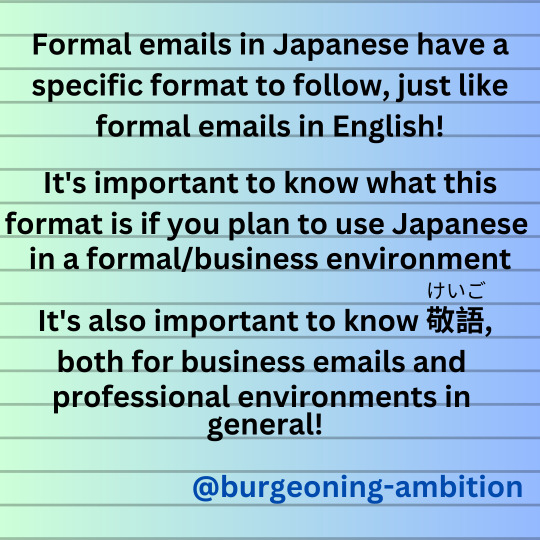
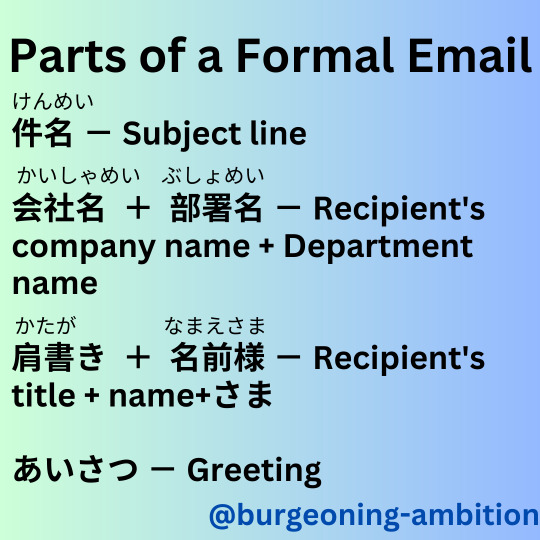

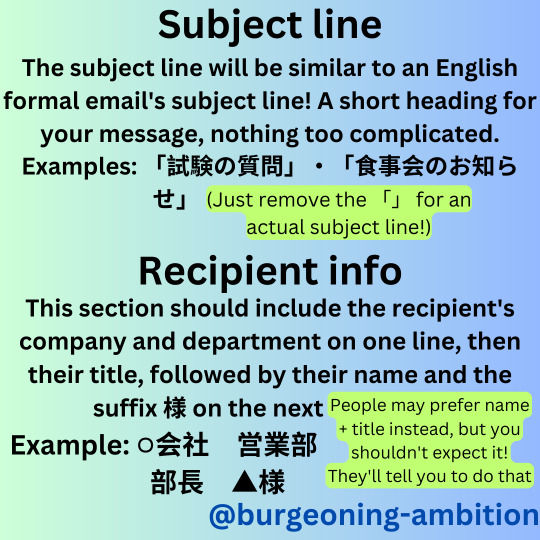

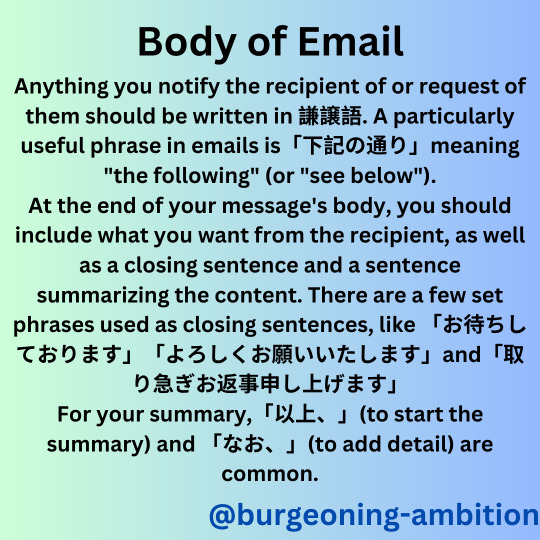
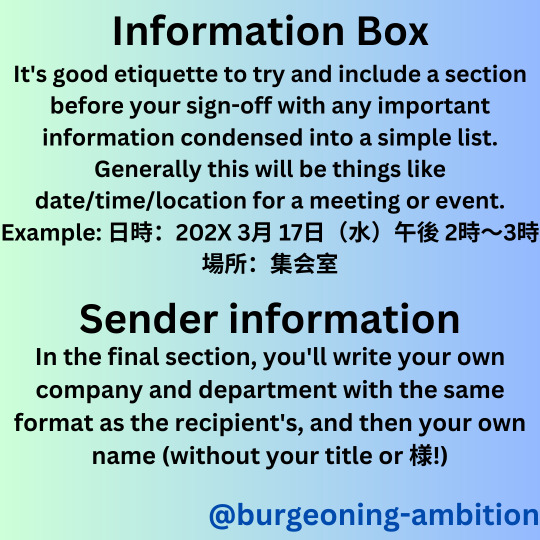
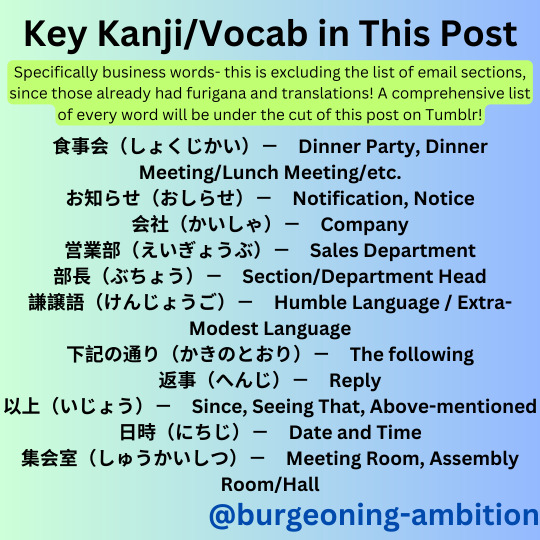
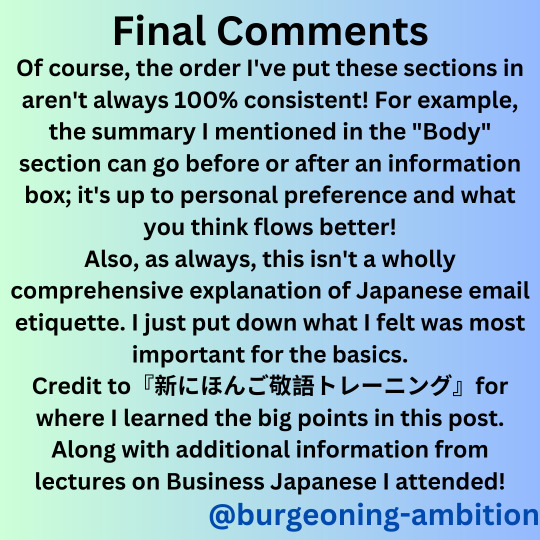
Business Japanese Review Part One: Emails!
I'm not sure how many posts I'll make about Business Japanese, but probably more than one so I say the part one is warranted, haha.
Feel free to add anything or any questions in the notes! Like I said, this isn't a fully comprehensive infographic. Also, what do people think of the lined paper style background for the title page/intro? I think they look kinda cute for the introduction, but not for the informative parts...
One thing I will add that I couldn't fit on the slides: I think some textbooks don't have super clear distinctions between 「謙譲語Ⅰ」 「謙譲語Ⅱ」 and 「ていねいご」, so I only specifically mention 謙譲語 broadly here. Parts of 謙譲語Ⅱ and ていねいご are both described as "extra-modest" in some things, for example! Just keep in mind that my post is a simplification, and if you're interested in formal language, maybe start at learning all of the different keigo categories and what they involve!
Vocab list note: The set phrases in the greetings and closings are all comparable to set phrases in English for greetings and closings of emails. I'm putting these set phrases in their entirety in the list, with a comparable English set phrase as the definition. Do not take these as equivalent phrases! They have a similar feeling, but I am not asserting that they have identical meanings. I'm just offering something comparable in case it helps a person make more sense of them!
The full vocab list + a transcript of the post is under the cut!
Vocabulary List
試験(しけん)- Exam, test
質問(しつもん)- Question
食事会(しょくじかい)- Dinner Party, Dinner Meeting/Lunch Meeting/etc.
お知らせ(おしらせ)- Notification, Notice
会社(かいしゃ)- Company
営業部(えいぎょうぶ)- Sales Department
部長(ぶちょう)- Section/Department Head
「いつもお世話になっております」 - This is a basic email greeting, similar to "Good afternoon" or "Hello, [name]" even though the meaning doesn't match at all!
「だんだん涼しくなってまいりました」 - Similar to "I hope this email finds you well"
さて - Now, Well, Then
謙譲語(けんじょうご)- Humble Language / Extra-Modest Language
下記の通り(かきのとおり)- The Following
返事(へんじ)- Reply
「お待ちしております」 - Similar to "Awaiting your reply"
「よろしくお願いいたします」 - Similar to "Thank you"
「取り急ぎお返事申し上げます」 - Similar to "Please get back to me soon"
申し上げます(もうしあげます)- To Offer, To Extend (thanks, congratulations, greetings, etc.), To Do, To State(謙譲語)
以上(いじょう)- Since, Seeing That, Above-mentioned
なお - Furthermore, In Addition
日時(にちじ)- Date and Time
午後(ごご)- PM (Time)
場所(ばしょ)- Place, Location
集会室(しゅうかいしつ)- Meeting Room, Assembly Room/Hall
#woah!!! this is so helpful! thank you!#and I personally like the lines! it’s a vibe!#japanese#japanese study blog#japanese langblr#japanese studyblr#language learning#studyblr#keigo#langblr#business japanese
723 notes
·
View notes
Note
Hello, I'm only wondering how you would go about building a track to get a job in these lines of works, if you have advice. Thank you :)
Hiya! 💗
I have some advice yeah! Do bear in mind, the way I got into Software Development, now focusing on Web Development, was:
A couple of months of self-studying HTML, CSS, JavaScript and Python
Applied for a Software Development Technician apprenticeship - working in a company whilst studying at a college (had to do it online because of COVID restrictions)
Completed the apprenticeship + 2 exam certificates in Programming and Software Development
The company I did my apprenticeship hired me straight after I passed.
Other people had similar routes e.g. via higher education at a university or college, or did the complete self-study route and got a job at a company or just freelancing. Everyone's journey is different!

Building a successful track to get a job in Software Development requires a combination of a lot of things and not just learning how to program. I will assume you want to get into Web Dev, but this can be applied to other areas e.g. Game Dev or Moblie Dev. Here are some steps you could take:
Education and Skill Development
The most obvious: you need the skills...
Could find schools, online schools, colleges or universities to learn the subject: This is if you can. Some people learn better with a teacher there to help them so maybe attending a school setting is better for you!
Online courses and tutorials: Enroll in online platforms like Coursera, Udemy, or Codecademy to learn specific programming languages (such as HTML, CSS, JavaScript), frameworks, and development tools commonly used in web development.
Build a portfolio: Create a collection of projects that showcase your skills. Develop websites, and web applications, or contribute to open-source projects to demonstrate your abilities to potential employers. Use places like GitHub or GitLab!
Practical Experience
If you don't have the opportunity to be already working in a company in their IT department for experience, try these two types of experience you could try for experience:
Internships and part-time jobs: Seek internships or part-time positions in software development companies. This provides hands-on experience, exposes you to real-world projects, and helps you understand industry practices.
Freelance work: Take up freelance web development projects to gain practical experience and expand your portfolio. Platforms like Upwork and Freelancer can help you find clients and build a reputation.
Networking and Professional Development
Join online communities: Engage with online forums, developer communities (such as Stack Overflow), and social media groups to connect with like-minded individuals, seek advice, and stay updated on industry news.
Create a presence and show off your coding journey: I am a huge advocate for this. I had friends that I've mentioned on my blog that got their first developer job solely because they were posting their projects and learning journey on their Twitter accounts. For example, my friend Hikari (her Twitter) got her job because the employer saw her tweets of her progress then he noticed her portfolio page and asked for an interview with her - then she got the job. Try your chances with this method!
Contribute to open-source projects: Collaborate on open-source projects on platforms like GitHub. This not only helps you enhance your coding skills but also showcases your ability to work in a team and contribute to larger projects! Working in a team is a key skill!

Hope this helps! Thanks for the ask! 🙌🏾💗
56 notes
·
View notes
Note
Hi Loa! You said you started off with HTML/CSS/JavaScript, and you post a lot about your website projects. So I wanted to ask if you have any advice for the process of designing a website and making various graphics. I enjoy coding a whole lot, but I've avoided front-end stuff until now because looking into design and tools for it made me feel a little overwhelmed. What would you do if you were to start learning anew web design for your coding job and hobby projects? Thank you a lot :)
Hiya! 💗
I'd be happy to share some advice on designing a website and creating graphics. It's great that you enjoy coding and want to explore front-end development and design, and don't worry, though I love frontend stuff a lot, I still find some things overwhelming e.g. I'm currently learning Django which I have put off from learning because it looked "hard" but now I love learning it. Just give yourself a little push and you'll enjoy it! 😉🙌🏾
Web Design Inspiration
Two key places I get inspiration for my website designs are Pinterest and Behance!
For instance, when I was, and still am, researching Old Web GUI designs, I made a Pinterest board of images relating to what I wanted to design and I used that as a reference when building the design in HTML and CSS. So, I would look at the picture and think "Okay in terms of HTML elements and CSS styling, how can I replicate this? 😉👍🏾". You can check out these boards: board 1 | board 2
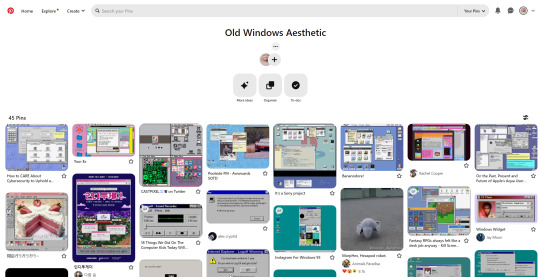
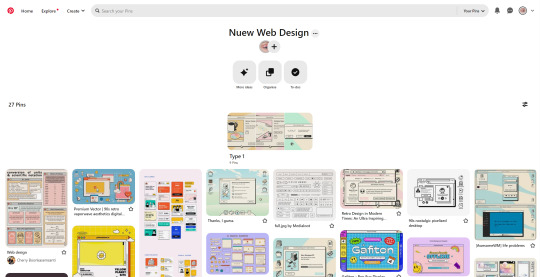
Pinterest is the main inspiration place, and Behance is for more in-depth web design components. What I mean is if I need inspiration for a navbar design or a certain card design, I would use Behance.

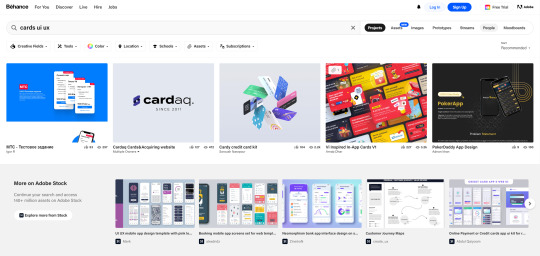
Now I don't particularly do this, which is bad, but I do recommend making a wireframe for your web designs. I talked about wireframes in a previous post, but to sum it up; wireframes are good because they allow you to stick to your design plans and not go off on a tangent. These are especially good when working in a team at work, for example.
The reason why I don't particularly do them as often as I should is because I see things in my head vividly enough that I won't forget where everything should be - no super power but that's the main reason I don't make wireframes. As well, I change ideas halfway through so there's no real need for me to keep making wireframes if I will change the design 2 minutes later! 😭💔
But that's just me, but you should totally start designing wireframes. Practising drawing up some wireframes will definitely help with being creative in your designs. Take everything around you as an inspiration. The way I think of it is to think like an artist who is capable of painting anything - all you have to do is look around and paint. You can do the same with web development - everything is an inspiration. I saw a person make a whole webpage with amazing graphics... just about water. You can do the same.
If you need help on that part, definitely look into graphic design. I took extra classes in Graphics (which was just graphic design) when in school which involved looking at graphic artists and studying their work, then replicating something with our own twist. You can do the same with web design - study websites online, some you like or random ones. Look at a piece of the website and try and replicate it. That's why I like projects which are like "make a Google clone" or "make a Netflix clone" because it gives you the chance to study other people's codes and you can keep that knowledge for any future projects!
And lastly, study web design principles. There are some principles that good websites all put into their design that make the user's experience good. Read this article about it and this should even give hints to how you could design your next website! Learn about fundamental design principles such as colour theory, typography, layout, and composition. Understanding these principles will help you create aesthetically pleasing and user-friendly designs.
Web Design Tools I Use
Now, what do I use every time I start a new "project", what online tools do I use? I literally have these on my browser's bookmarks, ready to go!
Pinterest (inspiration) - LINK
Behance (inspiration) - LINK
Coolors (colour palette generator) - LINK
CSS Gradient Generator (because I'm lazy) - LINK
Google Fonts (main source for fonts) - LINK
Font Palace (fonts I want but not on Google Fonts) - LINK
Font Awesome (for the little icons) - LINK
Image Colour Picker (if I have an image and I want to pick the colour from it) - LINK
Optional tools:
Bootstrap 4/5 (sometimes I use this for personal projects, definitely use it at work) - LINK
Pattern.css (creates a patterned background for you, again I'm lazy) - LINK
Storyset on Freepik (people graphic images) - LINK
Pexels (stock background and even fake product images) - LINK
Unsplash (same as Pexel) - LINK
LottieFiles (set animations) - LINK
TinyPNG (makes image sizes smaller so less space) - LINK
CSSmatic (4 cool CSS generators) - LINK

That's all I have to say, if I didn't help with your question, message me to help you further but I do hope this helps you!! Good luck! 🥰🙌🏾💗
115 notes
·
View notes
Text

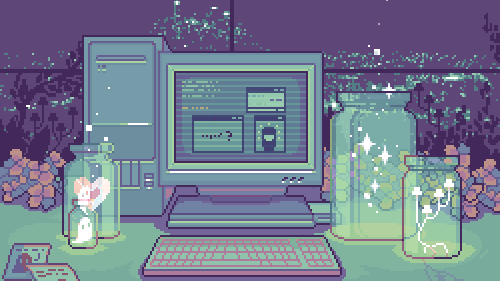
✧・゚~~ introduction ~~・゚✧
hi the name is aloe, i'm a uni student from australia, and i'm studying an it degree. i am very much a beginner at programming, but i'm willing to learn: hopefully you'll see me somewhat around codeblr on a regular basis. more specifically, i'm hoping to break into an infosec career, or maybe study artificial intelligence further along the line during my course—but really i'm trying to figure out what i like. currently learning indonesian on duolingo, so i might dabble in langblr as well. nice to meet you! (main blog: @recosie)
about me:
pronouns: they/them.
my hobbies: reading, writing, programming, gaming, walking around the neighbourhood & late discord movie nights with friends.
my projects: right now, i'm following a simple python tutorial where i code a video game with pygame. my next project will probably be me trying to create a discord bot or a text editor.
interests: superheroes (dc), c-dramas, k-dramas, rpg & open world games (undertale/deltarune, dragon age, persona 5), podcasts (currently listening to batman unburied), reading (sci-fi fantasy, nonfiction) & deep diving youtube.
academic interests: artificial intelligence, infosec, programming, web dev, comp sci, sociolinguistics, psychology, history, literature, design, translation, philosophy, poetry.
what to expect from blog: studyblr challenges, dev logs, uni posting, & many reblogs of references and resources. just anything to keep myself motivated to study.
48 notes
·
View notes
Text
Calling all computer science/programming blogs!
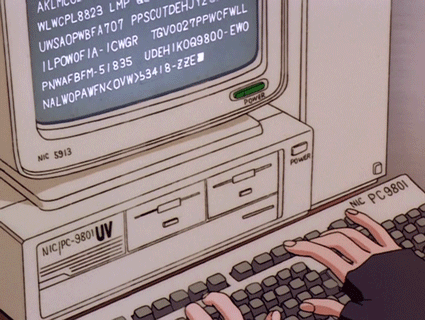
Hello everyone! ʕ•́ᴥ•̀ʔっ
I have been getting dms of people wanting to follow other blogs like mine where I post my progress with programming / experimenting with different programming languages / tips and tricks / resources etc but they can't find them easily soooo I am making a post to reach the blogs these people want to find!
If you post about anything in the list belong, please reblog or comment your blog's @ so the right people can reach your blog:
programming a language
computer science
relevant memes
general talk about either subject
provide resources
student in any of the subjects
do challenges with computer science e.g. 100 days of Code
I just want this to reach as many people so our lil community within Tumblr can grow! Have a lovely day!
661 notes
·
View notes
Text
Beginner JavaScript Projects
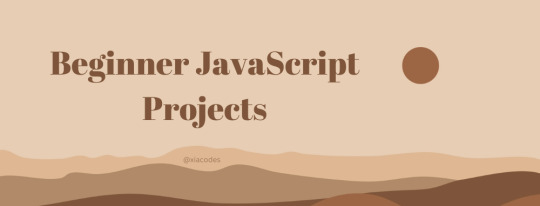
POV: You’ve studied HTML and CSS, you’ve made some cool projects and now you’re moving on to learn JavaScript. If you're just starting out learning JavaScript, it can be helpful to have a list of beginner projects to work on in order to get your feet wet and gain practical experience.
I’ve combined a list of 5 mini projects to be working on - some I have done myself! Don’t worry, for each project I've added a video tutorial that you could use as a reference to help with your own version of the project!
━━━ ⋆⋅☆
Basic image gallery 📸

A web page displays a grid of images and allows the user to click on an image to view a larger version of it. This could come in handy when making Tumblr themes 👀
The JavaScript side: Handle the user's clicks!
Video tutorial: [LINK]
━ ⋆
Simple to-do list app 📝
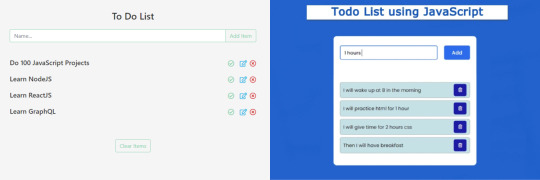
A web page that allows the user to add, remove, and mark items on a to-do list.
The JavaScript side: Manipulate the page's HTML elements and store the to-do list data in the browser's local storage!
Video tutorial: [LINK]
━ ⋆
Basic calculator 🧮
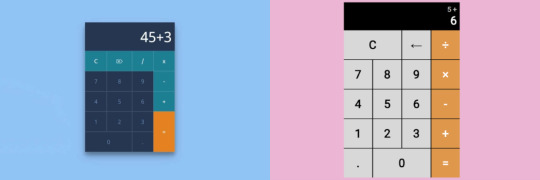
A web page with a simple calculator that can perform basic arithmetic operations.
The JavaScript side: Handles user input, perform calculations, and display the results on the page!
Video tutorial: [LINK]
━ ⋆
Random quote generator 📜
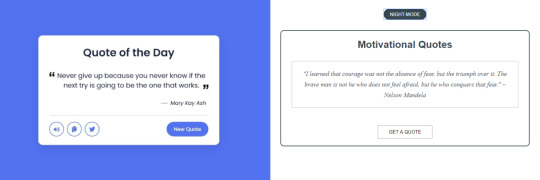
A web page that displays a random quote from a predefined list of quotes each time the page is loaded or a button is clicked.
The JavaScript side: Selects a random quote from the list and displays it on the page.
Video tutorial: [LINK]
━ ⋆
Simple rock-paper-scissors game 🎮
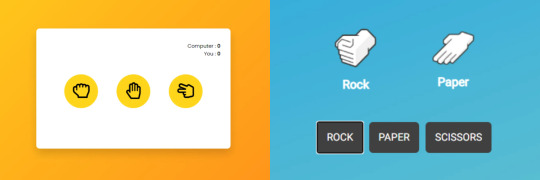
A web page that allows the user to play a game of rock-paper-scissors against the computer. I did this project during my coding night classes! 😊
The JavaScript side: Handles user input, generates the computer's move and determines the winner of the game.
Video tutorial: [LINK]
━━━ ⋆⋅☆
I hope this helps someone, it's really good to build projects as you're learning! JavaScript can be a bit tricky towards the harder concepts so it's good to have a good understanding of the basics, project building helps with that! Thanks for reading and have a nice day/night! 💻👍🏾
[⏪ previous programming post]
338 notes
·
View notes
Note
Hey! I saw your personal project rec post but I was wondering if you had any suggestions for projects that can’t use libraries? I am applying for an opportunity where we have to code something from scratch so I imagine it can be something small would you have any ideas? Thank you!

Hiya! 💕
Since I don't know what languages you will be using, I'm just going to give you some quick and easy projects that are either webpage-building and console application ideas!

Webpage Project Ideas
Personal Portfolio: Create a simple personal portfolio website showcasing your skills, projects, and contact information. Use pure HTML, CSS, and JavaScript for responsive design and interactivity.
Simple Blog: Develop a basic blog where you can post articles and visitors can read and leave comments. Implement features such as user authentication, a comment system, and article categorization using only vanilla JavaScript, HTML, and CSS.
To-Do List: Build a to-do list web application that allows users to create, edit, and delete tasks. Add the ability to mark tasks as complete and filter tasks based on their completion status. Implement this project using only HTML, CSS, and JavaScript.
Console Application Ideas
Text-based Adventure Game: Create a text-based adventure game where users can navigate through different rooms, pick up items, and interact with characters. Design the game with an interesting storyline and various challenges to engage the player.
File Organizer: Write a console application that organizes files in a directory based on their file types (e.g., images, documents, videos). The app should create folders for each file type and move the corresponding files into their respective folders.
Basic Calculator: Develop a console-based calculator that can perform basic arithmetic operations like addition, subtraction, multiplication, and division. Enhance the functionality by adding support for parentheses and differentiating between integer and floating-point arithmetic.

These projects your coding skills for your opportunity without relying on any external libraries. I think it's kind of good that they want to see people code from scratch, just to see where their abilities are at!
I made another post about projects before that you can check out if you don't like the ones I listed: Beginner JavaScript Projects
Hope this helps! Good luck with your opportunity! 🥰👍🏾💗
53 notes
·
View notes
Text
Lend Me Your Heart
As promised, here is a not-so-brief synopsis of the dating sim I'm working on!
Lend Me Your Heart is a visual novel in which you are a transfer student going to a new university (thanks to your old university for axing your major program, sigh). Your new university puts you in the upperclassmen housing they offer, so you don't have to worry about getting an apartment, but the building you were placed in is rumored to be... Cursed. People say that the basement is haunted, that you can hear screams coming from the rooms, that people lose their minds when they live there. The basement also happens to be where you're moving in. Which is... Fantastic.
You're the last person to move in on the floor, so you're able to get to know everyone right away. They all seem nice enough, not without their quirks, but nothing off-putting (and they're all quite attractive). Where, then, are all of these rumors coming from? Everyone else is also new to the basement this year, so maybe the curse was broken the year before? You hope for that, but strange things are already happening...
Less story-like description of the game + content warnings under the cut!
Lend Me Your Heart is a yandere dating sim, in which you live in a dorm surrounded by characters who become completely and utterly enamored with you. Enough to do some horrible things to keep you safe.
The game has five main love interests, with two or three non-romanceable, but important, side characters (currently). Each character has a different path of study in school and different... Methods to their madness. Which you learn about the further you progress on their routes! It's a visual novel, so your agency is based on dialogue choices (which may have more relevancy than you think no matter which ending you plan to get!)
If you like the handful of yandere imagines I wrote on my imagines blog, you'll probably like this.
Some more non-story stuff: You can choose the pronouns you use, it doesn't restrict you from getting any routes. If you choose not to input anything for pronouns, the game uses he/him by default. The current love interest options are all men, and have canon appearances already.
I'll introduce the characters (featuring some of my very messy sketches of them) soon!
Right now I'm making it in RenPy, but that may change if I need things that I can't do in it! (Although honestly given the games created by RenPy in the past, I think it may work fine for my needs)
What you will encounter depends on which route you focus on, so this list will definitely get expanded upon as the game gets closer to having some kind of release, but generally speaking:
Content Warnings:
Yandere trope (especially obsession)
Stalking
Blood/Gore (written descriptions will often be more detailed/potentially gruesome than visual art) (I can't draw gore well)
Murder
Needles/Knives/Other sharp weapons
Sexual content
17 notes
·
View notes
Text
Hello!
I'm SicklySweet (is that a name? I'm counting it as one because that's what my branding is!) and this blog is functioning as a progress log for my dating sim, Lend Me Your Heart! (A post detailing the plot more is coming next)
I wanted a place beyond just a giant document to hold all of my info, and I figured posting it somewhere people could see it would be nice, especially once I get some form of the game posted somewhere (probably itchio)!
I may also eventually post stuff from other projects, but that'll come later.
You may recognize me/my writing style from my imagines blog, @sickly-sweet-imagines -- yes that's also me! I've stopped posting on that imagines blog, largely due to disrespect I received from certain people, but I'm still alive and well as a creator! If you enjoyed my fics, you'll probably also enjoy Lend Me Your Heart (when it's in a less abstract pre-alpha state, haha)
I'll have my ko-fi linked in a few places on this blog, and the commissions I offered via ko-fi on my imagines blog still stand! For now, at least, that may change if I get busier, but I'm still gonna keep writing commissions available for people as long as I can.
I'm not entirely sure what I'll put on this blog yet, honestly. I have a lot of rough sketches of characters and stuff, but I've gone through design evolutions and such that make me hesitant to post the original sketches. Plus, I can only really upload traditional art right now since I don't have my drawing tablet with me, and I'm not sure how high quality my photos can get... I'll have to think about it more. But I hope people can enjoy my creations if they run into them! My writing is far better than my visual art in my opinion, so I'll definitely be balancing both of those when I post! It won't be all one or the other.
I think that's everything for my introduction! Again, a post about the game itself (the general plot and any content warnings, mostly) will be coming next ^-^
#not a studyblr#but so important to me!#I’m so excited for this#sicklysweet#lend me your heart#lend me your heart game
8 notes
·
View notes
Text
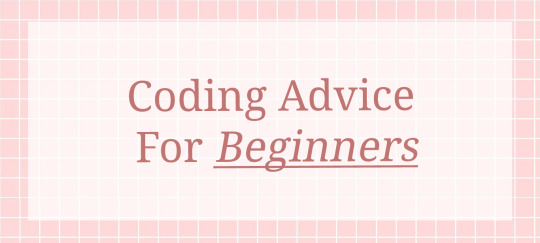
I've seen a lot more people coming on Tumblr who are starting their coding journey, which is great! If you're just starting out with coding, here are a few tips that can help you get started and improve your skills:
1. Start with a language that is simple and easy to learn - These languages are designed to be beginner-friendly and will help you get a feel for the basics of coding. E.g. Python
2. Work through tutorials and online courses to learn the fundamentals of programming - There are many free resources available online that can help you get started, such as Codeacademy and Khan Academy.
3. Practice, practice, practice! - The more you code, the better you will get. Try to solve problems and write small programs on your own to improve your skills.
4. Don't be afraid to ask for help when you need it - There are many online communities, forums, and subreddits where you can get help and support from other programmers.
5. Keep learning and expanding your knowledge - As you gain more experience, try to learn new languages and technologies to broaden your skillset and improve your ability to solve complex problems.
I hope this helps and happy coding! 💻👍🏾❤️
*Advice from developers on Twitter and YouTube and my instructors
#programming#coding#programmer#code#codeblr#comp sci#studyblr#studying#coding advice#programming advice
821 notes
·
View notes
